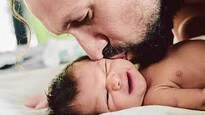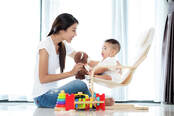Welcome to the Family & Child Development Lab!
Welcome to the Family and Child Development Laboratory! The lab is under the direction of Ashley M. Groh, Ph.D., and was founded in 2014. We are located at the University of Missouri in McReynolds Hall and are affiliated with the Department of Psychological Sciences. This website is intended to provide parents and researchers with information about the scientific activities of our lab. Please take a look around to learn more about who we are and what we do.
Research conducted in our lab focuses on the developmental origins of the quality of parent-child relationships and legacy of these relationships for social and emotional development. We apply a biopsychosocial perspective to understand the mechanisms by which early interpersonal experiences are carried forward across development and generations. The goals of our research are to provide insight into the ways in which early interpersonal experiences might serve as an organizing force in development across the lifespan and to identify the mechanisms by which adversity with close relationships might be overcome.
Research conducted in our lab focuses on the developmental origins of the quality of parent-child relationships and legacy of these relationships for social and emotional development. We apply a biopsychosocial perspective to understand the mechanisms by which early interpersonal experiences are carried forward across development and generations. The goals of our research are to provide insight into the ways in which early interpersonal experiences might serve as an organizing force in development across the lifespan and to identify the mechanisms by which adversity with close relationships might be overcome.
Commitment to Diversity, Equity, and Inclusion
The Family & Child Development Lab is committed to promoting diversity, equity, and inclusivity. We recognize that this effort is a shared responsibility that requires a conscious effort across research and education within and outside of our lab. We view diversity as a strength to improving our academic and scientific pursuits. We are committed to consistently working toward creating the conditions that will support and expand a more diverse community and shared understanding.
To create a more comprehensive understanding of close relationships across the lifespan, our laboratory engages in research with ethnically, racially, and socio-economically diverse families and children (e.g., PROMISE Study, ACE Study; Haltigan et al., 2019; Groh et al., 2019). Moreover, an important goal of our meta-analytic research is to identify critical gaps in research on close relationships as they pertain to diversity and representation (e.g., racial/ethnic, socioeconomic, and geographic backgrounds; e.g., Borowski et al., 2021; Penner et al., 2023).
Our lab welcomes individuals from all backgrounds, including but not limited to nationality, culture, race, ethnicity, religion, sexual orientation, gender expression, gender identity, disability, education, and economic background.
We do not tolerate discrimination or any indication of intolerance towards others. We hold ourselves, and each other, accountable to ensure equity and inclusivity in all that we do. We are also committed to understanding and working against any biases we have.
For those interested in working with the Family & Child Development Lab, we encourage applications from all backgrounds and all levels of training, particularly those who belong to communities that have been historically and systematically marginalized backgrounds.
To create a more comprehensive understanding of close relationships across the lifespan, our laboratory engages in research with ethnically, racially, and socio-economically diverse families and children (e.g., PROMISE Study, ACE Study; Haltigan et al., 2019; Groh et al., 2019). Moreover, an important goal of our meta-analytic research is to identify critical gaps in research on close relationships as they pertain to diversity and representation (e.g., racial/ethnic, socioeconomic, and geographic backgrounds; e.g., Borowski et al., 2021; Penner et al., 2023).
Our lab welcomes individuals from all backgrounds, including but not limited to nationality, culture, race, ethnicity, religion, sexual orientation, gender expression, gender identity, disability, education, and economic background.
We do not tolerate discrimination or any indication of intolerance towards others. We hold ourselves, and each other, accountable to ensure equity and inclusivity in all that we do. We are also committed to understanding and working against any biases we have.
For those interested in working with the Family & Child Development Lab, we encourage applications from all backgrounds and all levels of training, particularly those who belong to communities that have been historically and systematically marginalized backgrounds.
Land Acknowledgement
Dr. Groh and members of Family & Child Development Lab respectfully acknowledge that we reside on the traditional ancestral lands of the Osage Nation, Otae-Missouri, Chikasaw, Illni, Ioway, Quapaw, Delaware, Kickapoo, Sac & Fox, Omaha, and Santee Sioux who were unjustly displaced. The members of Family & Child Development Lab, individually and collectively, are committed to reflecting on and supporting Indigenous Peoples’ rights and activities to achieve community wellness and self-determination. This acknowledgement gives gratitude to the peoples on whose land we live, learn, and work as we seek to improve and strengthen our relations with our tribal nations.




